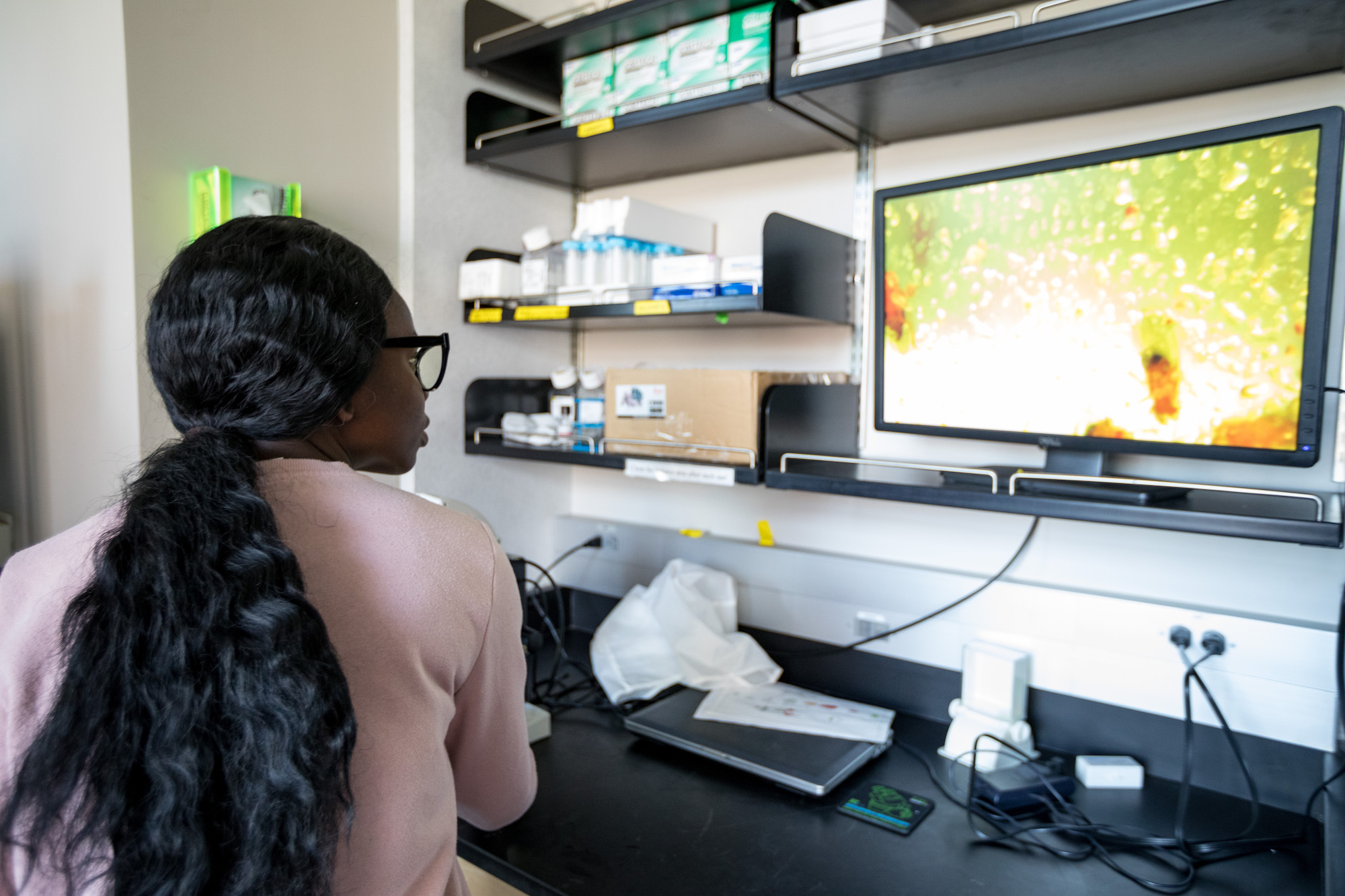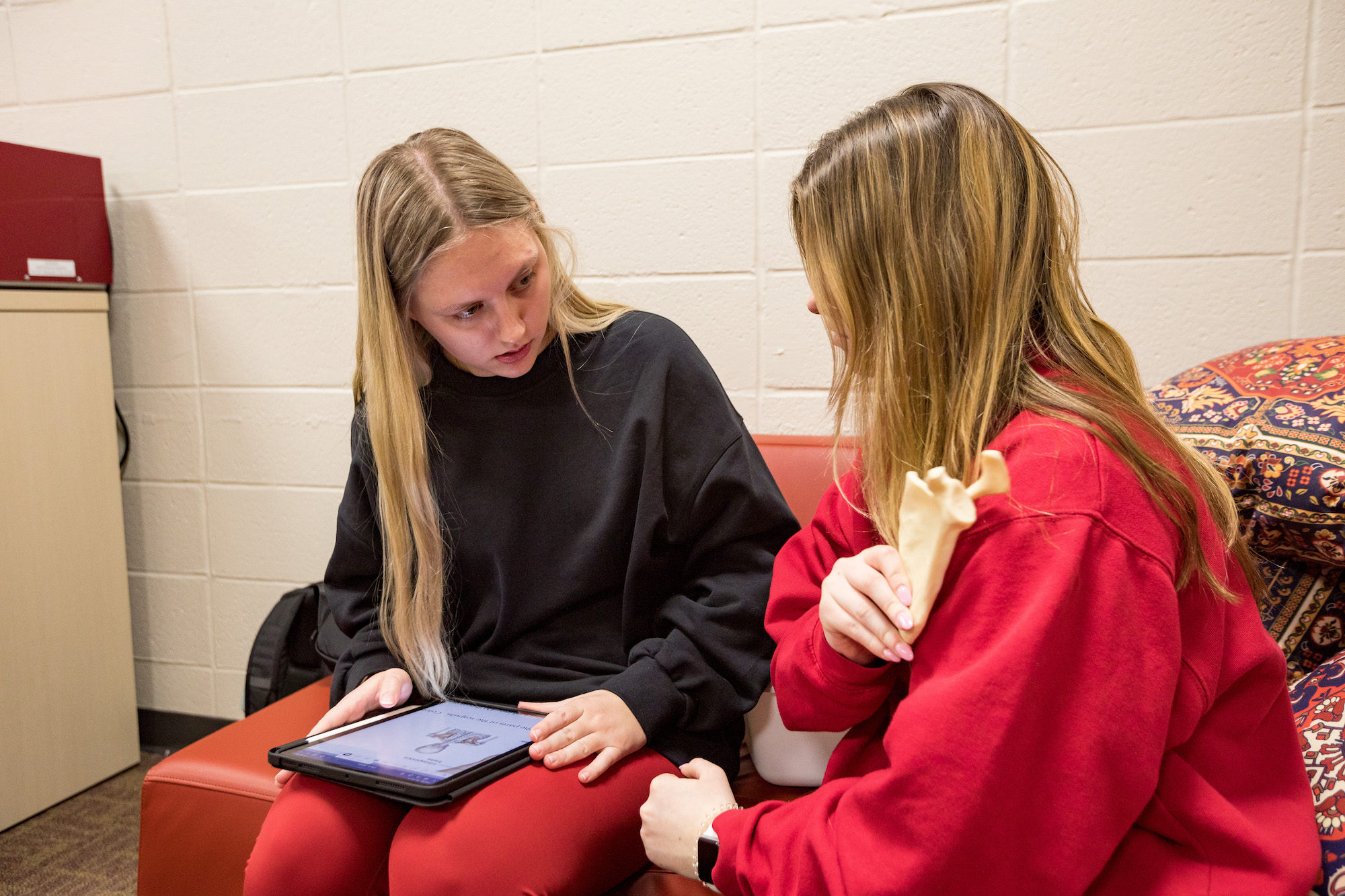Department of Biology Student Engagement
Current Opportunities for Biology Students
Undergraduate TA Positions
The Biology Department is currently accepting applications for undergraduate TA positions!This experience can be taken for BIOL 369 credit or as a paid internship (in some
cases).
- BIOL 114
- BIOL 121
- BIOL 123
- BIOL 131
- BIOL 132
- BIOL 212
- BIOL 322
Interested students must be entering at least your third year in 23-24 (i.e., junior or senior status).
Become A BioCoach
- Attend 8 classes and lead small groups through activities.
- Expected to host a study session for your small group before each exam.
WHAT YOU GET:
- One hour of BIOL 369 credit
- A refresher on foundational concepts for entrance exams
- A great line for your CV
- Help underclassmen through a difficult biology course
- Confidence and community building
- More connections within our department
Interested students must have completed BIOL 120, 121, 122 and 123 with Bs or better.
| BIOL 120: 001 | OCH 1006 | MWF | 09:10 am-10:05 am |
| BIOL 120: 004 | OCH 1006 | TR | 09:35 am-10:55 am |
| BIOL 122: 001 | SH 2113 | MWF | 09:10 am-10:05 am |
| BIOL 122: 002 | SH 1108 | TR | 09:35 am-10:55 am |
Become a Biology Ambassador
Biology Ambassadors are an elite group of students who represent the Biology Department and assist with recruitment, retention and advising activities. An Ambassador’s job is to help prospective students and other visitors understand that WKU is truly an exceptional place and that the Biology Department is ready to help them reach their educational and career goals.
Ambassador Duties:
- Represent the Biology Department at student recruitment and career events both on and off campus (transportation to off campus events will be provided)
- Assist with on-campus events representing the Department of Biology.
- Provide tours to prospective students, their parents and other campus visitors.
- Assist with student awards banquets, honors luncheons, science fairs and similar events.
-
Other duties may arise where the Department Chair (Michael Smith), and/or Office Coordinator and the Bio Ambassador Supervisor (Jenny Clauson) may request your assistance.
Ambassador Requirements:
- Must be Biology major. This includes any major within the Biology Department: Biology, Biochemistry, Molecular Biotechnology and Medical Laboratory Sciences.
- Must be a full time student
- Must have Sophomore standing or higher
- Must have a cumulative GPA of 2.75 or higher. Your Biology GPA must be 3.0 or higher. In addition, if your GPA falls below 2.5 or you obtain a D or F in a biology class, your ambassador position will be terminated.
- Excellent communication skills and poise in dealing with diverse groups of visitors
- Attend mandatory training session(s)
- Respond promptly to ambassador supervisor regarding availability to help with events
- Ability to devote at least 30 hours per semester while maintaining GPA requirement
Ambassador Benefits:
- Up to $500 scholarship per semester. Final scholarship amount is determined by the extent to which requirements are met.
- Biology Department shirt
- Getting acquainted with other students, faculty and staff
- Great resume builder
Student Resources
Use the button links below to download and fill out forms needed for the Biology Dept. You will need to work with your advisor to know if these classes/forms are right for you. If you have questions regarding a course, please reach out to the Office Coordinator Jenny Clauson at jenny.clauson@wku.edu.
|
BIOL 399 |
A study involving a research project under faculty supervision. Note: The course may be repeated with a maximum of (6) (ref. 525) or 3 hours (ref. 617) counted toward the major. Prerequisite(s): BIOL 120 with a minimum grade of C and BIOL 121 with a minimum grade of C and BIOL 122 with a minimum grade of C and BIOL 123 with a minimum grade of C |
|
BIOL 369 |
Practical experience in a supervised, professional work environment in an instructional classroom, business, industry, government agency or laboratory setting. Prerequisite(s): BIOL 120 with a minimum grade of C and BIOL 121 with a minimum grade of C and BIOL 122 with a minimum grade of C and BIOL 123 with a minimum grade of C |
|
Departmental Exams developed by WKU departmental faculty committee. The credit hours earned through these examinations will count toward graduation, but will not apply to WKU residence credit or be used to compute grade point averages since a letter grade will not be given. Contact biology@wku.edu to see if the course you are seeking can be included. |
Because students should consider both their curricular and extracurricular choices as important to their preparation for their future career and personal goals, Pre-Health Professions Advisors provide information on course requirements as well as on issues such as gaining practical experience and taking advantage of special undergraduate study programs.
Pre-Health Professions Advising
Pre-Health Toolboxes
Taking a college course is an investment.
Deciding to start college is like starting a garden that requires daily attention. You have to water plants, get rid of weeds, manage pests and harvest fruits. When you decide on college you have agreed to apply for a job. Do not go to college if you are not ready to start another job -It’s that simple! If you already work for another employer when you start college now you have 2 employers. You are now your second employer because you now are working for yourself; you are investing in yourself. College means you have a daily work schedule. Each individual college course requires a daily clock-in and clock-out in addition to class meeting time. That job starts at the beginning of your semester.
The steps below outline good habits in managing yourself as an employee for this investment. Your pay for this job is directly proportional to your performance. College is a commission-based job. If you follow these habits and work hard, you receive the maximum payment for your work (term letter grade A). If you are lazy, procrastinate, or focus on meaningless distractions, then you will receive very little to nothing for your work and your investment was a waste of time and money.
- Get Organized. Plan and schedule your study time. Don’t make excuses and don’t walk away.
- Take notes. Taking notes is essential! Whenever material is being presented in person or online prepare to take notes. Make sure you have a pencil and notebook and write an outline of the topics presented. Stay actively engaged during the presentation.
- Don't multitask. Trying to work on a poster presentation for one class while you are studying for another with the television and radio playing is not a model for academic success.
- Divide it up. Studying is difficult and never easy at the beginning. Stop the study marathon habit of cramming information one or two days before an exam. Dividing your study workload into daily manageable chunks will prove more effective. The manageable chunks must start when the material is first presented.
- Study. There’s a right and a wrong way to study. Review your material daily in small chunks and in different manners (for example, write flashcards, make your own practice tests with the questions provided in your manual or text. Invite a study group over, draw test results out and make tables in your note book). Use color pencils.
- Repetition, follow a schedule. Do you work better right after school or after you've eaten dinner? Are you more productive in 90-minute blocks or half-hour spurts? Find a schedule that works for you, and stick to it. (Example: Every evening 8:30-9:00PM I will make flash cards. Every morning 6:30-7:00AM I will study my flash cards).
- Manage your study space. Find a place that will maximize your productivity. Stay away from televisions, put your cell phone in another room and walk away! Use a quiet place where you are comfortable and productive.
- Find a study group. Sitting down with a group of people who are learning the same material can be helpful. Quiz each other and re-teach the material to each other. Teaching someone else is the best way to learn.
- Ask questions. Asking for help directly from the instructor from the beginning. Do not trust all the material you may find on the internet. When using online references check the source of the information.
- Sleep. Don't underestimate the importance of sleep! Getting a good night's rest will sharpen your focus and improve your working memory. Schedule your sleep as you schedule your work.
- John M. Clauson, M.S.
Microbiology Laboratory Coordinator/Instructor
WKU and the Department of Biology offer many resources for students, from tutoring to research guides.
Calm is an app that uses audio from sleep stories to relaxing sounds for cultivating a great night sleep.
Monday is a fully customizable app for tracking class requirements, grades, projects, or extracurricular activities.
White Squirrel Weather to keep a check on weather for planning study events, walks to class, breaks, or exercise.
*These apps are not endorsed in anyway by WKU or the Biology Department and are simply suggestions.


Student Organizations
The Department of Biology at WKU offers a variety of student organizations to help students get involved and excel during their time on the hill and beyond. To learn more or to join a student organization, please contact the faculty advisor associated with the organization of interest, listed below. For campus-wide Student Activities, visit The Department of Student Activities.
Please fill out Biology Club Interest Form to receive more information about your club of interest.
Some of the links on this page may require additional software to view.



